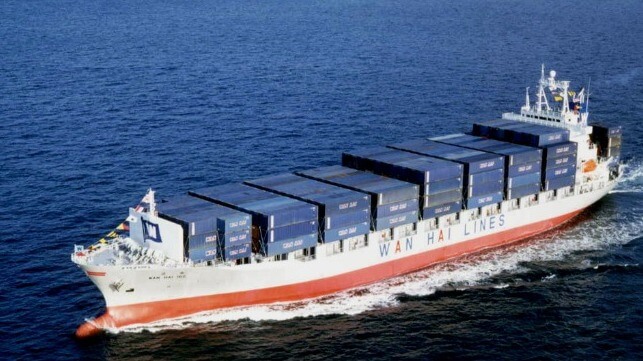Wan Hai Pays $680K for California Port Emissions Violations

Taiwan shipping company Wan Hai Line is the latest shipping company fined by California for failure to comply with the state’s strict emissions standards for vessels at berth. First introduced more than a decade ago with compliance enforced since 2014, California limits the use of auxiliary engines and emissions while at berth and will further expand the regulations starting next year.
The California Air Resources Board reached a settlement agreement with Wan Hai Lines for $680,750 for violations of the Ocean-Going Vessels At-Berth Regulation. Included in the agreement are $340,375 in civil penalty with the other half of the settlement being used to fund the installation of an air filtration system in Oakland, California schools and an elementary school and early education center in Los Angeles.
The violations were found during a routine audit by CARB’s Enforcement Division of fleets visiting California ports in 2020. The audit revealed that Wan Hai failed to reduce its fleet auxiliary engine power generation by at least 80 percent while docked at the ports of Los Angeles and Long Beach and failed to meet the three-hour operational time limit for at least 80 percent of its fleet’s visits. The operational time limit caps at a maximum of three hours the number of hours a vessel may run its engines while in port.
“I commend our Enforcement Division on their diligence in finding these violations that contribute to California’s air quality challenges,” said CARB Executive Officer Richard W. Corey. “We appreciate that Wan Hai made significant efforts to come into compliance and correct the violations immediately to reduce their fleets’ emissions.”
The Ocean-Going Vessel At-Berth Regulation was first adopted in 2007 with the regulation covering container ships, passenger ships, and refrigerated-cargo ships at six California ports including Los Angeles, Long Beach, Oakland, San Diego, San Francisco, and Hueneme.

that matters most
Get the latest maritime news delivered to your inbox daily.
Del Monte Fresh Produce reached the largest settlement to date in 2020 for nearly $2 million after admitting that vessels it chartered did not meet the operational time limits while calling at the Port of Hueneme between 2015 and 2019, during which time the limits started at 50 percent and increased to 70 percent. Among the other large settlements was $965,000 with COSCO Container Lines in 2019 and $630,625 with MSC in 2018. In 2020, Mitsui O.S.K. agreed to a $253,300 settlement.
Updates to the regulations, approved in 2020, will transition the program to reach nearly all commercial ships arriving at the ports. The existing regulation stays in force through 2022 covering container, reefer, and cruise vessels before being expanded in 2023. Auto carriers will need to comply starting in 2025, while tankers docking at the Port of Los Angeles and the Port of Long Beach must also comply starting in 2025, but tankers docking in Northern California have until 2027. Once fully implemented, CARB estimates the updated regulation will deliver a 90 percent reduction in pollution from an expected additional 2,300 vessel visits per year.
